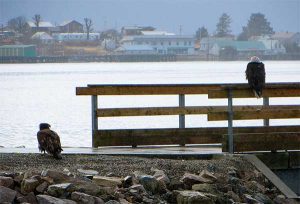Topics - Alaska
Alaska
Village Life

Land-based living has prevailed historically in Alaska. Traditional nomadic ways of life ceased to exist with the onset of Western influence. The end of this nomadic lifestyle, however, did not bring an end to established natural resource harvesting practices. Rural Alaskans, primarily Alaska Natives, still depend greatly on the land’s readily available wildlife and plant resources. For some villages, locally harvested resources make up more than half of the average daily consumption. This ancient way of life is also deeply embedded in the residents’ emotional and spiritual relationship to the land. Alaska Natives maintain cultural identity, subsistence living and survival through inherent connections to the land and the natural resources of their surroundings.
Rural Alaska depends on a cash-based system combined with natural resource harvesting, allowing Alaskan villages to maintain a living to support themselves and their families. Generally, incomes are low and prices are high in these communities. For example, a gallon of milk that costs $3.50 in Alaska’s city of Anchorage can cost $10.00 in a remote village. In addition, the 2021 per capita income in the Anchorage area was $43,125, compared to $31,857 in the Newtok census area.1 In order to hunt, fish, or gather legally in Alaska, supplies, permits and fossil fuels are necessary; thus employment is required to subsidize traditional natural resource harvesting and subsistence practices in rural Alaska.
Rural Alaska has witnessed drastic lifestyle changes in the short time since it became a state in 1959. These changes include an ever-increasing dependence on fossil fuels, particularly gasoline and diesel fuel. Fossil-fuel use impacts virtually every aspect of Alaska’s ecosystems even as it helps alleviate some of the demands of living in such a harsh environment. Today, nearly all Alaskan residents rely on fossil fuels in their daily activities. The use of snowmobiles and motorized boats has helped ease the intense and rigorous lifestyle of rural residents as they have allowed for a more accessible and comfortable way to hunt, fish, and gather traditional foods.
While these new technologies add to the problem of fossil-fuel dependence, they also provide ways to adapt to climate change impacts. The people of Southwest Alaska have noticed extreme changes in the environment, including lower precipitation rates, which result in lower lake and river levels. These lower water levels have prevented hunters from entering previously accessible areas in some tributaries because of the exposed land. However, some recent technologies allow people to reach these hunting areas once again, easing the transition to the evolving landscape.
Sources:
- Alaska Department of Labor and Workforce Development. (2021). Available online from: https://labor.alaska.gov/ [accessed January 26, 2023].
CONNECT WITH US
Nikki Cooley
Co-Director
Nikki.Cooley@nau.edu
Karen Cozzetto
Manager
Karen.Cozzetto@nau.edu
Your tax deductible donation supports ITEP’s programming efforts.
Please contact us if you would like to contribute to our endowment or for any additional information regarding donations.

